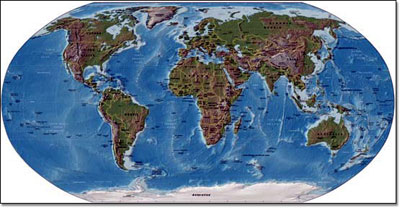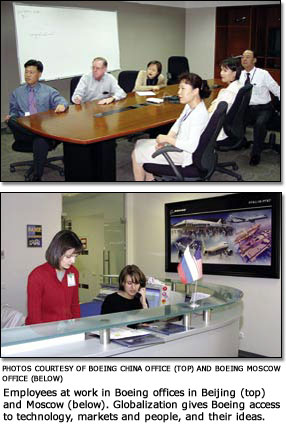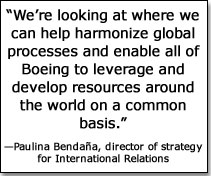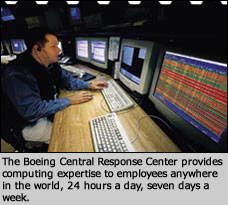| GOING GLOBAL
How Boeing is changing the way it works
around the world
BY KATHERINE BECK, WITH PAUL PROCTOR, TOM DOWNEY
AND JUNU KIM

The word "Boeing" is recognized in dozens of languages. To
many people around the world, it's even used as a common noun for one
of the company's main products, commercial airliners. People all over
the planet know Boeing in much the same way as they know Coca-Cola or
Nike.
This international name recognition, combined with the fact that Boeing
has customers in 145 countries, makes a powerful statement about the success
the company has had selling its products internationally. It also reflects
the historic role Boeing products have played in connecting and protecting
people in times of calm and of crisis.
 But
name recognition and international sales do not make a company global
in the modern sense of the word. Today, a global company is recognized
as a local part of the communities, regions and countries where it does
business. And for Boeing to survive and thrive, it too must become a global
enterprise. But
name recognition and international sales do not make a company global
in the modern sense of the word. Today, a global company is recognized
as a local part of the communities, regions and countries where it does
business. And for Boeing to survive and thrive, it too must become a global
enterprise.
"A global market is inevitable. So is global competition," said
Boeing Chairman and CEO Phil Condit. "If we're going to continue
creating value and opportunity, including jobs for Boeing people, we need
to be global. It is no longer enough to arrive with a great product or
service and expect to make a sale. Boeing must become part of the fabric
of the communities in which we do business. In fact, if any big company
is to be successful in the future, it has to be global," he said.
A classic example is Nestlé, which began its globalization efforts
in 1905. Today it sells its products in practically every country in the
world. In the United Kingdom, it's perceived as a British company, in
France, as a French company, in Brazil, as a Brazilian company.
Actually, it's a Swiss company. But an American child enjoying a glass
of Nestlé's Quick doesn't think of it as a Swiss product. Nestlé's
successful globalization has allowed it to realize tremendous growth.
As the world's largest food company, it has more than 225,000 employees
and 500 factories around the world. It couldn't have done that if it hadn't
looked for opportunities outside of Switzerland, or if it simply sent
out sales representatives on missions to sell products.
In addition to access to markets for a company's products and services,
globalization typically opens doors to new technologies and the ideas
of talented people with different cultures, backgrounds and experiences.
During the mid 1990s, Mercedes-Benz built its first U.S. auto plant in
Tuscaloosa, Ala., where the automaker would assemble its new M-class sport
utility vehicle. Since production started, Mercedes' annual U.S. sales
have jumped from 122,265 vehicles in 1997 — the year the Tuscaloosa
plant opened — to 206,638 in 2001. That increase came about in large
part from M-class sales, which in 2001 totaled 45,655, or 22.1 percent
of the automaker's annual total. The model and the facility have been
so successful that Mercedes has expanded the plant twice and is undertaking
a third expansion program, which will boost employment from about 2,000
to 4,000.
Part of the plant's success stems from an implementation of new ideas.
Typically, the U.S.-based factories of non-U.S. auto-makers run just as
the plants do in the company's home country. But for its Alabama facility,
Mercedes shunned its traditional labor-intensive production techniques,
and sought to instill a production process that incorporated continuous
improvement, employee involvement and other efficiency-oriented practices.
It also hired North American auto industry employees who had the experience
to create an efficient workplace. The result: Mercedes took the lessons
learned in Alabama and created a standardized rulebook on operating proce-dures
for its factories worldwide.
"One main benefit of globalization is the leveraging of enterprise-wide
capabilities and resources across borders," said Tom Pickering, senior
vice president, International Relations. "No one nation or people
has a monopoly on good ideas. If we're going to be the best, we have to
include the best people, ideas and technologies from around the world
in our business, products and services."
The Boeing approach
Boeing is actively pursuing a strategy for globalization and global value
creation through new partnerships, joint ventures, mergers and acquisitions,
supplier relationships and a greatly expanded international presence.
Currently some 5,300, or about 3 percent of the 174,000 employees of Boeing
and its subsidiaries, are based outside the United States. They are distributed
throughout 61 countries and territories, including approximately 3,000
in Australia with hundreds more in Britain, Germany and Russia, combined.
Indeed, Condit predicts that Boeing will have "significant operations
inside other countries in the next five years."
Key to the pursuit of this expanded global strategy was the January 2001
establishment of Boeing's International Relations organization led by
Pickering (see profile).
At the time, Condit said, "We clearly understand that we need to
bring greater focus to our global presence." A year before, he set
the stage for the global push when he told Aviation Week & Space
Technology magazine, "I think we're on the threshold of having
a very global, mobile world, and the implications for aviation are huge."
 One
of the major thrusts of International Relations is to establish new country
or regional executives and country strategy teams. In the past, there
were no full-time enterprise-wide country executives. "Overseas"
offices were mainly individual business unit operations focused on one
activity such as sales or procurement with someone doubling as a country
executive. One
of the major thrusts of International Relations is to establish new country
or regional executives and country strategy teams. In the past, there
were no full-time enterprise-wide country executives. "Overseas"
offices were mainly individual business unit operations focused on one
activity such as sales or procurement with someone doubling as a country
executive.
This, however, is changing rapidly. Five country executives (see
sidebar, below) have been hired in the past year; more are planned.
Pickering and his staff are aggressively identifying qualified candidates,
high-caliber people who are knowledgeable about local culture and language,
to head up a network of as many as 25 country or regional offices by 2005.
These new executives will work with business units to identify supplier,
partnership and joint-venture opportunities, and address regulatory and
governmental issues that can affect Boeing. They also will advise and
aid marketing campaigns. But sales, Pickering said, should be made by
the people who design and build the products.
Country leaders also will increase Boeing's visibility and broaden its
commitment to countries where they serve. They'll actively communicate
that commitment to audiences in those countries — industry, media,
government, academia and other stakeholders — and build strong relationships
with them. They'll also help deliver the Boeing message clearly across
cultures, to do business in sensitive and effective ways.
With country teams in place, according to Pickering, Boeing people from
all over the enterprise will be able to count on the expertise of knowledgeable,
in-country experts who can smooth their way, brief them on appropriate
local business practices, and put them in touch with key business and
government contacts.
A bigger, better Boeing
To U.S.-based Boeing employees concerned about jobs going abroad, Pickering
said that many people think of Boeing as a pie, and believe that moving
some activities overseas leaves a triangular empty shape on the plate.
"But actually, by working strategically around the world we are growing
the pie so there is more value to be shared by shareholders in terms of
profit and by employees everywhere in terms of job opportunities. In fact,
it is estimated that between 20 percent and 30 percent of all new jobs
in the U.S. over the last decade have essentially come from [the U.S.]
ability to be a major player on the world scene," he said.
Several recent Boeing acquisitions exemplify both the company's growing
global reach and the resulting advantages this strategy brings the company
and its workforce: Australia's Preston Aviation Solutions, with offices
in Washington, D.C., and London, provides sophisticated simulation, decision
support, and scheduling software for airlines and airports worldwide.
Its intellectual capital and products are expected to contribute to a
strategic advantage for the new Boeing Air Traffic Management business
unit.
Jeppesen Sanderson Inc., a Boeing subsidiary since October 2000, is the
world's leading supplier of flight information, flight planning services,
aviation weather services, maintenance information and aviation training
systems. It has an 85 percent global airline market share for its core
navigation services such as aeronautical charts and electronic navigation
data. Jeppesen products are a key component of Boeing's growing customer
information services business. Jeppesen has offices in the United States,
the United Kingdom, Germany, Australia, China and Russia.
 As
Boeing produces globally, it also is sourcing globally. Although some
procurements are required as a condition of purchase for major Boeing
buys by non-U.S. customers, most are accomplished as part of a search
for high quality and lower cost supplier-partners that add value to the
Boeing enterprise and increase overall competitiveness. As
Boeing produces globally, it also is sourcing globally. Although some
procurements are required as a condition of purchase for major Boeing
buys by non-U.S. customers, most are accomplished as part of a search
for high quality and lower cost supplier-partners that add value to the
Boeing enterprise and increase overall competitiveness.
One example: Almost 400 Russian engineers work for Boeing in Moscow, and
are linked electronically to a design team in Seattle. This effectively
creates two engineering shifts a day in Moscow, working back-to-back with
one in Seattle due to time zone differences. Not only does this give Boeing
an around-the-clock engineering capacity, it provides access to scarce
aeronautical engineering talent.
The recent establishment of a new Phantom Works research and technology
center in Madrid will allow Boeing to tap European expertise in areas
under study there — environmental and air traffic management technologies.
More research and technology centers in other countries are planned.
Another example of Boeing's increasing international role is the series
of Boeing-sponsored International Technology Summits that have been held
in Tokyo, London, Paris and Madrid. More are scheduled for Berlin, Seoul,
and other locations. These events bring together decision makers from
important regions to discuss key topics such as air traffic management,
aerospace and the environment, international co-operation in defense,
future aircraft concepts, advanced manufacturing and more. These summits
allow Boeing leadership to meet with and exchange views and information
with leading members of international academia, government and industry.
Representatives from Phantom Works, Boeing country leaders and country
strategy teams, and Boeing's London-based International Communications
organization organize the summits.
The people side
With increased global activity also comes a new human resources approach,
departing from the model that made more sense in the years after World
War II, when America faced very little competition from an outside world
whose industrial base had been devastated.
Common practice then at Boeing and at many other American companies was
to send out American employees to run a foreign office staffed with bilingual
or multilingual locals.
Sometimes the American employees knew or learned the language, became
familiar with the culture, and developed long-term relationships in the
countries where they represented Boeing. Sometimes, the American managers
didn't speak the language or know much about the culture. Continuity often
came from the local staff that got new arrivals up to speed as they rotated
through.
"We're looking at where we can help harmonize global processes and
enable all of Boeing to leverage and develop resources around the world
on a common basis," said Paulina Bendaña, Director of Strategy
for International Relations.
This means establishing processes for attracting, hiring, and retaining
Boeing employees based outside the United States. Planning to meet that
challenge is Joyce Tucker, vice president Global Diversity (see
related sidebar below).
Tucker and human resources professionals at Boeing World Headquarters
in Chicago and across Boeing business units are currently conducting an
extensive study of the countries, cultures and laws where Boeing does
business — and plans to do business — worldwide. "It's
critical that we create a diverse and skilled workforce," said Tucker.
"In addition, we must also create an environment that supports the
cultural differences within the organizations where we work, the customers
we serve and the communities we live in." This also means adhering
to local rules and practices while meeting the U.S. laws under which Boeing
operates, Tucker said.
Boeing, too, must be more inclusive of employees from all over the world,
so that they feel more a part of the Boeing global enterprise, as well
as providing them with opportunities for mobility within the company.
It also must improve the way in which Boeing selects American employees
for international assignments, make such international assignments career-enhancing
opportunities and best use their expanded knowledge after they return
to their homeland, according to Tucker.
Boeing's Global Leadership Program also is helping company executives
develop and broaden their global mindset. This 27-day course takes managers
on certain career succession tracks to Europe, Asia or South America to
learn about Boeing suppliers, customers and competitors in their own surroundings.
A key goal is to sensitize these executives to the history, politics,
culture and traditions of a specific region. With this background, course
participants study the business practices, competitive dynamics and market
opportunities within these areas and report back to the company's Executive
Council.
Working smarter
Another piece of the globalization strategy is the speedier delivery of
in-depth global knowledge to Boeing leadership. Pickering and his staff
regularly write articles and analysis pieces about the world's political
and economic situation. These are forwarded to members of Boeing's Executive
Council, providing timely information and insight on world business prospects
and political changes that could affect business units and Boeing markets.
As part of her job, Bendaña is tasked with finding ways to augment
this information with knowledge from country teams and country team leaders
around the world as Boeing globalization progresses.
World full of customers
In the end, according to Pickering, globalization gets down to people
— Boeing people — on the ground and up to speed.
"From the human resources point of view, globalization increases
our pool of talented resources manyfold. And, it also will give us a different
outlook on the world — a world full of the customers, the technology
and the production opportunities we need to build value and stay prosperous.
As we operate more effectively globally, we will become more knowledgeable,
more flexible, and more open to new ideas — and ultimately more successful
as a business," Pickering said.
Transforming Boeing from a company that sells successfully internationally
to an established global enterprise won't happen overnight. It could be
years before Boeing achieves the global depth and localization it needs
to sustain long-term competitiveness. However, with strong backing from
the Boeing board of directors, the Office of the Chairman and business
unit leadership, the company is marching ahead with its strategy to develop
a global mindset and global presence.
"We must move quickly," said Condit. "The world will not
wait, and our competitors will not wait. A global Boeing is a winning
Boeing."
|
GOING
E-GLOBAL
As Boeing enters the 21st century, the pace of change — worldwide
change — is accelerating, according to Scott Griffin, chief information
officer. Companies are becoming increasingly global, linking themselves
electronically with suppliers and customers around the world.
"Our vision is to create instant access to information by anyone in
the enterprise from anywhere in the world," Griffin said. "This vision
will be realized fully when virtual teams, dispersed around the globe,
work together as if they were in the same room."
For this reason, Boeing has committed to developing and deploying
"e" services quickly, Griffin said. "Enabling technologies" that will
help change the way people work at Boeing include the Internet, which
will continue to play a critical role by allowing the company to develop
new business models. Employees, customers, and suppliers around the
world can be connected to each other and Boeing via the Web with minimum
investment.
Computing power, too, will be everywhere, Griffin said. It will allow
users, for example, to design products concurrently with Boeing partners
and suppliers, validate that they are who they say they are, track
and age inventory no matter where it is in the world, and provide
real-time information on how Boeing factories and assembly lines (and
those of suppliers) are being utilized.
 Lou
Platt, former chief executive officer of Hewlett-Packard and a member
of the Boeing board of directors, predicts that wireless computing
may be the technology that most profoundly impacts business. It already
has changed the way mechanics work on the flight line. It allows the
airplane to indicate part replacement needs before it parks at the
gate, informs mechanics as to the most successful steps in diagnosing
a possible fault, and provides electronic maintenance manuals at the
point of use instead of at some distant centralized area. Lou
Platt, former chief executive officer of Hewlett-Packard and a member
of the Boeing board of directors, predicts that wireless computing
may be the technology that most profoundly impacts business. It already
has changed the way mechanics work on the flight line. It allows the
airplane to indicate part replacement needs before it parks at the
gate, informs mechanics as to the most successful steps in diagnosing
a possible fault, and provides electronic maintenance manuals at the
point of use instead of at some distant centralized area.
E-enabling already is improving Boeing performance. Consider this:
In the next 24 hours Boeing will add $156 million in revenue and acquire
$100 million in parts and services. More than $1 million of that revenue
will be obtained via the Web, making Boeing one of the top five e-commerce
sites in the world.
During the same time period, Boeing will ship more than 5,000 spares
— mostly ordered over the Internet — to customers from eight
distribution centers. The company also will place nearly 50,000 purchase
orders for goods and services, with a significant portion ordered
online.
In 2000, Boeing, Lockheed Martin, Raytheon, and BAE Systems formed
Exostar, an electronic marketplace that would increase the efficiency
of transactions and collaborations across the aerospace and defense
industry supply-chain. Last year, Rolls Royce joined Exostar as its
fifth partner.
"Exostar can deliver enormous buying and selling efficiencies to our
industry," said Laurette Koellner, Boeing senior vice president and
Exostar board member. "By using a single e-marketplace, all of our
manufacturers, suppliers, customers, and service-providers can lower
transaction costs significantly."
Exostar companies do business with more than 37,000 suppliers, hundreds
of airlines, and nearly every national government for a total combined
yearly procurement outlay of $71 billion.
"Linking our procurement systems through Exostar to and from our suppliers
already has been beneficial to Boeing." said Paul Pasquier, who directs
the eBuy@Boeing program. "We're especially pleased with the savings
we've realized from electronic auctions."
Boeing business units have found they save an average of 15 percent
when they use electronic auctions to award contracts. The online bidding
process allows suppliers to make real-time adjustments to respond
to the bids of competitors.
"When time runs out we have a winner," said Pasquier. "If a lower
bid comes in during the last two minutes of the auction, Exostar adds
an additional two minutes. It gets pretty exciting during those overtimes
— and the results ensure that Boeing gets the best price available."
|
|